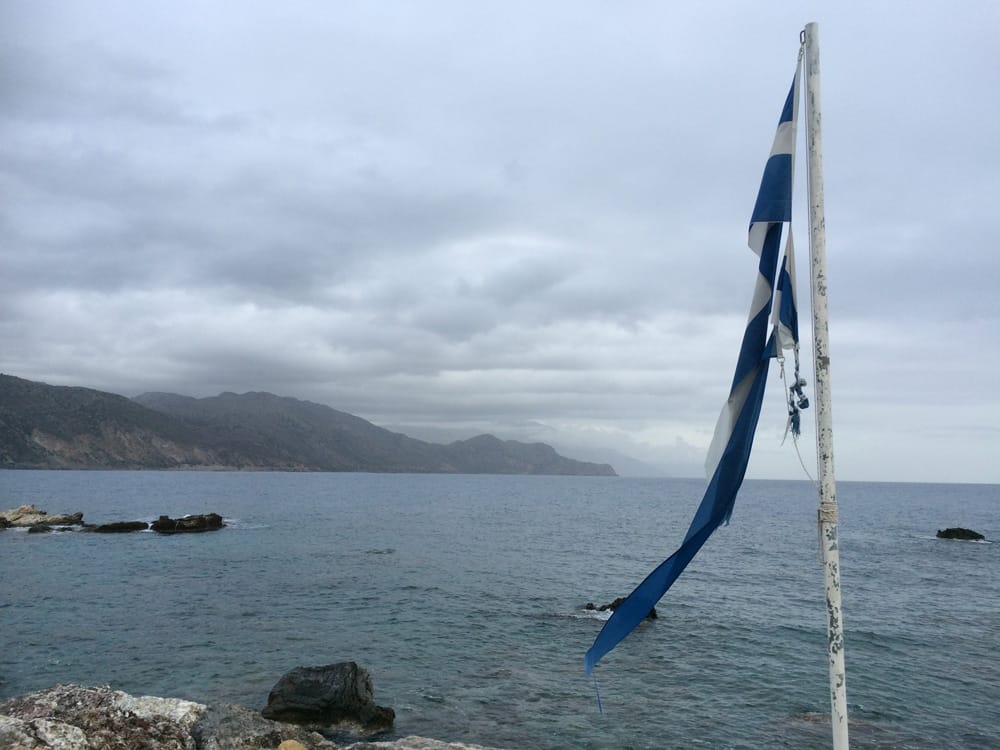Greece seems to be synonymous with “crisis” these days. The debt crisis, the migrant crisis, or just the “Greek crisis”, as if the whole country is in a permanent state of crisis. Interestingly, the very word “crisis” is of Greek origin, but krisis means “decision”, and those mostly get made in Brussels or Berlin these days.
What I’ve never seen before is a coherent linking of the various crises afflicting this country that I love and in which I lived for a couple of years. That task was accomplished recently by Stathis Kouvelakis in a wonderful essay for New Left Review.
In the essay, entitled Borderland, Kouvelakis explores Greece’s status as “Europe’s ‘Other within’” following its debt and migrant crises. It’s at the forefront of the attempt to keep out unwanted migrants, and it’s also at the forefront of a new, intense class struggle in which Europe’s bankers take control of the Greek economy and even Greek democracy to an unprecedented extent. Well, unprecedented in Europe—subaltern regions are all too familiar with debt-imposed recolonisation, but Greece is a laboratory for its extension to areas formerly seen as part of the centre rather than the margins.
The Sub-Spaces Within Europe
In exploring the status of Greece in Europe, Kouvelakis reveals the cracks and fault-lines in European identity itself. The European Union may play on people’s desire for integration and harmony, but at its heart it is something much darker:
The EU … confiscates the name of ‘Europe’ to conceal at the symbolic level the operation of exclusion that lies at its core.
Despite the “free movement of people” that is enshrined in various treaties and is one of the ‘four freedoms’ enshrined in the 1957 Treaty of Rome, Kouvelakis shows how Europe is divided into sub-spaces with different rules:
- The Schengen area (22 countries), in which free movement exists, but only for EU nationals, not migrant workers. (And border controls can be reinstated for security reasons, which has happened 92 times since 2006, mostly in response to social protests.)
- The non-Schengen EU states (6 countries), of which some shun the fundamental concept of free movement (e.g. the UK) and others have been excluded from it (e.g. Romania & Bulgaria).
- Schengen states outside the EU (6 countries): mostly northern and central European countries, which by virtue of free movement are in practice ‘more European’ than some countries inside the EU.
- European countries that are non-EU and non-Schengen (5 of the Balkan states and some of the western parts of the former USSR). Greece is, of course, a notable exception, thanks to its former status as Cold War outpost of “the West”.
The ‘Migrant Crisis’ and Harsher Border Controls
So what emerges is a picture of fragmentation. Adding to this is the Dublin Convention of refugees, which stipulates that refugees must apply for asylum in the first country they reach. This leads to fragmentation even within the Schengen area, with the southern states becoming frontier holding pens to shield northern Europe from the influx. And Fortress Europe then extends outwards into Turkey and North Africa, with shady security deals to keep the migrants at bay, no matter the consequences for things like human rights.
Kouvelakis does a great job of linking free movement within the Schengen area with the toughening of borders in Greece and other borderlands. He charts the huge increase in deaths since 1990, as fear of migrants moving freely through Europe led to the closing of border routes that were once open, forcing people into ever more dangerous maritime routes (a similar argument to the one I explored in my review of Violent Borders). Kouvelakis also points out the hypocrisy and racism of Europe’s indifference to the tens of thousands of deaths that were occurring for so many years before a boy washed up on a beach and got our attention, and he compares it to the outpouring of compassion over the 1,000 people who died trying to cross from East to West Germany in the Cold War.
Greece as the ‘Other Within’
As for the notion of Greece as an internal border of Europe, the front line in the grand neoliberal experiment, Kouvelakis shows convincingly how the Memorandum of Understanding utterly dismantled Greek sovereignty. It’s the traditional IMF model that has reaped so much destruction across the global South: cut-price sale of state assets to foreign corporations, deregulation, cuts in social spending, lowering of labour costs, and so on. The effect on the Greek economy and Greek people has been catastrophic, and Syriza’s attempt to deal with it failed because of their unwillingness to take the radical step of leaving the EU:
This is Greece’s bitter lesson for the forces of social transformation. Those who are not prepared to fight to the finish to break free from the iron cage called the European Union are doomed to capitulate.
It’s a sad picture of Europe. I believe so strongly in the value of European integration, and I am sad that my own country, the UK, voted to leave. I think that cooperation across national borders is essential if we are to have any kind of viable future. But I have to agree with Kouvelakis that there is a very dark, coercive side to the EU. It plays us the Ode to Joy while it acts as a debt collector for banks. And, like most debt collectors, it knows that even if breaking the kneecaps of a man with no money doesn’t help him repay his debt, it certainly encourages others to toe the line.





There are 2 comments
Superb post Andrew. I follow some of these issues but I am not all that knowledgeable about all of them. What you wrote here is what I also believe. The EU is beleficial. But there are some negatives. What happened in Greece in regards to the debt crises seemed very wrongheaded. The place of Greece in all this seems complicated. In the end, I am hopeful that liberal values will win out.
Thanks Brian! Yes, it’s complicated. I think that with Brexit happening, a lot of people I know in the UK are becoming more pro-EU as a reaction against the narrow-minded nationalism that drove much of the vote. I’m sad because I have always been so strongly in favour of closer ties between countries and greater cooperation within Europe, but I think that the EU needs to be radically reformed if it is to survive. It needs to be much more democratic and accountable to ordinary people in all of its member countries. But, with or without Brexit, I don’t see that happening any time soon.